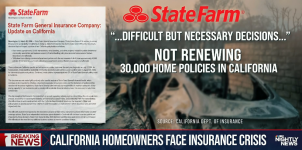California Fires
Death toll climbs, thousands more structures burn as LA races to get control of fires

"There's enough water. This has nothing to do with the supply of water. It has to do with the pressure in the system." Juliette Kayyem, Harvard Kennedy School
The infrastructure isn't adequate to serve the population.
Republicans chant "tax cuts". And entire neighborhoods are laid waste.
Death toll climbs, thousands more structures burn as LA races to get control of fires

"There's enough water. This has nothing to do with the supply of water. It has to do with the pressure in the system." Juliette Kayyem, Harvard Kennedy School
The infrastructure isn't adequate to serve the population.
Republicans chant "tax cuts". And entire neighborhoods are laid waste.
"Everybody wants to go to Heaven, but nobody wants to die. ... People want the public services. We can't have the public services without some level of taxation."
United States House of Representatives Financial Services Chairman Barney Frank
